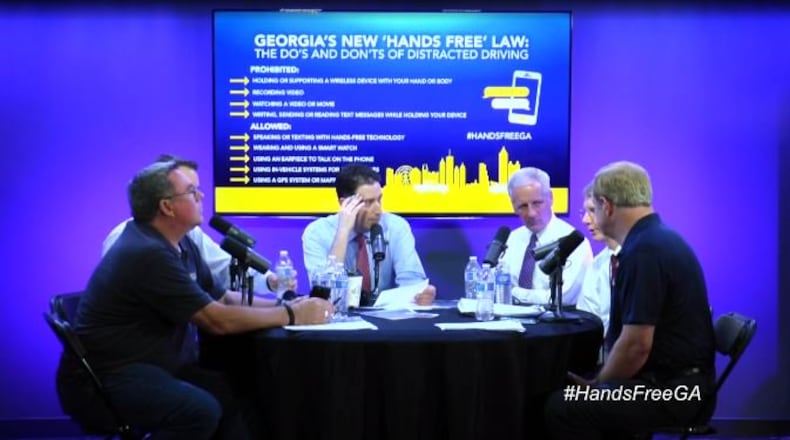Georgia's new hands-free driving law goes into effect in a matter of days and, if one thing's clear, it's that a lot of folks still aren't quite clear on what's legal and what's not.
The bottom line, though, is this: You can’t hold your phone while you’re driving. Period.
“Get a mount, get used to it, get used to getting that phone out of your hands,” said Mark McKay, a WSB Radio traffic reporter.
Mark Arum, Richard Eliott and colleagues from News 95.5/AM750 WSB, Channel 2 Action News, and The Atlanta Journal-Constitution hosted a roundtable discussion Tuesday night about the new Hands-Free Georgia Act, which goes into effect July 1. Members of law enforcement, government officials and other experts also joined them.
They answered a full range of nagging (and recurring) questions.
Many of them — gleaned from “traffic troopers” in the studio audience, other listeners and readers and from social media — were familiar ones.
Is there a formal "grace period" where law enforcement will be offering warnings instead of citations? Nope. While some agencies have said they will put this into practice, there is no grace period actually written into the law. Tickets can be written July 1.
“Don’t wait until July 1,” AAA-Georgia spokesman Garrett Townsend said. “Start now.”
Can I use my GPS? Yes, as long as you're not physically holding or supporting your phone while you do it.
What about when I'm at red lights and stop signs? Rules still apply. You have to be "legally parked" to handle your phone.
What about voice technology and talk-to-text and stuff? Sure — drivers can actually talk on their phones and text and control music programs, as long as they're using hands-free technology.
Can I still fool around with the stereo built into my dashboard? You can. But be careful, OK?
The penalties associated with violations of the hands-free law are $50 and one point on your driver’s license for the first citation; $100 and two points for the second; $150 and three points for the third; and so on.
In the grander scheme of things, the fines aren’t much. But the main goal is to save lives, officials said.
“I love personal freedom just as much as anybody else,” state Rep. John Carson, R-Marietta, who introduced the legislation, said during a call-in to Tuesday’s roundtable. “But what I also want is public safety, to live with that personal freedom for another day.”
Kathy and Craig Clark, whose daughter Emily was one of the five Georgia Southern University nursing students killed in a horrific 2015 crash, were among those in the roundtable audience. They were active in the getting the hands-free law passed, and were present when Gov. Nathan Deal signed it last month.
“Knowing what we’ve gone through, and if that was me that had done that, caused a life to be lost, I don’t know how I’d live with myself,” Kathy Clark said. “It’s a hard thing to have to go through.”
PROHIBITED:
- Holding or supporting a wireless device with you hand or body
- Recording video
- Watching a video or movie
- Writing, sending or reading text messages while holding your device
ALLOWED:
- Speaking or texting with hands-free technology
- Wearing and using a smart watch
- Using an earpiece to talk on the phone
- Using in-vehicle systems for all purposes
- Using a GPS system or mapping app
About the Author
The Latest
Featured



